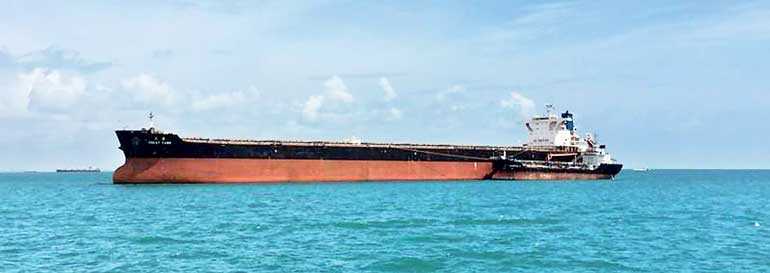Thursday Feb 19, 2026
Thursday Feb 19, 2026
Monday, 29 October 2018 00:00 - - {{hitsCtrl.values.hits}}

FILE PHOTO: A dry-bulk ship is seen taking on bunker fuel in the Singapore Straits on - REUTERS
London (Reuters): The United Nations shipping agency pushed back this week on any phased entry for tougher marine fuel rules and further tightened regulations that will come into force in 2020.
The International Maritime Organisation will prohibit ships from using fuels with sulphur content above 0.5% from 1 January, 2020, compared with 3.5% today, unless they are equipped with so-called scrubbers to clean up sulphur emissions.
Ships found in breach of the new rules will face fines or the risk of impoundment by IMO member states.
The shipping and oil-refining industries are scrambling to prepare for the shift and have made large investments to comply with the new standards since they were set in 2016.
Oil companies expect a jump in demand for cleaner distillates, mainly diesel, at the expense of fuel oil that would become largely redundant.
Last week, Washington said it backed a phase-in of the 2020 rules to protect consumers from any price spikes in heating and trucking fuels, although it did not seek a delay.
Some shipping associations together with the Bahamas, Liberia, Panama and the Marshall Islands had proposed an “experience-building phase”, which gained support from Washington, leading to widespread market speculation in recent days about a possible review of the regulatory timeframe.
A discussion of their proposal in London this week at the IMO’s Marine Environment Protection Committee, MEPC 73, failed to advance after the chair of the session said it was too vague.
The paper’s backers were told they could submit more concrete proposals at the next MEPC in May 2019 - especially focused on data collection and fuel oil quality.
That timeframe would, however, leave little time realistically before the regulations kick in for any potential review.
The IMO has reiterated that there will be no delay in implementing the rules.
A US Coast Guard official said on Thursday that Washington sought a “pragmatic” approach and would seek to develop proposals with like-minded countries for the May 2019 meeting.
Some analysts including Rapidan Energy Group have suggested that major stakeholders including flag carriers were working to push back the global sulphur ban.
They also suggested that US President Donald Trump’s administration was likely to oppose the 2020 start date as it would cause a significant diesel, distillate and heating oil price spike in the winter of a US presidential election year.
“Many saw MEPC 73 as the last chance to delay or soften implementation and the fact that both proposals were rejected strongly suggests that IMO 2020 will enter the market as expected on Jan. 1, 2020,” Vienna-based consultancy JBC Energy said in a note on Friday.
Regulations tightened
The IMO on Friday adopted a ban on ships carrying high-sulphur marine fuel unless they have special equipment on board, further tightening regulations.
This latest amendment, which comes into force on March 1, 2020, makes it illegal for ships to carry high-sulphur fuel “for combustion purposes, for propulsion or operation on board” without scrubbers, which was not codified in the main regulation.
“The amendment does not change in any way the entry into force date of the 0.50% limit from Jan. 1, 2020. It is intended as an additional measure to support consistent implementation and compliance and provide a means for effective enforcement by states, particularly port state control,” the IMO said on Friday.
Roger Strevens, chair of the Trident Alliance - a coalition of shipping companies that has pushed for enforcement of the sulphur rules - said Friday’s adoption was “an unmistakable signal” of the IMO’s commitment to “full and effective implementation”.
“The focus now shifts to preparation, both on the part of the industry and of the enforcement authorities,” Strevens said.